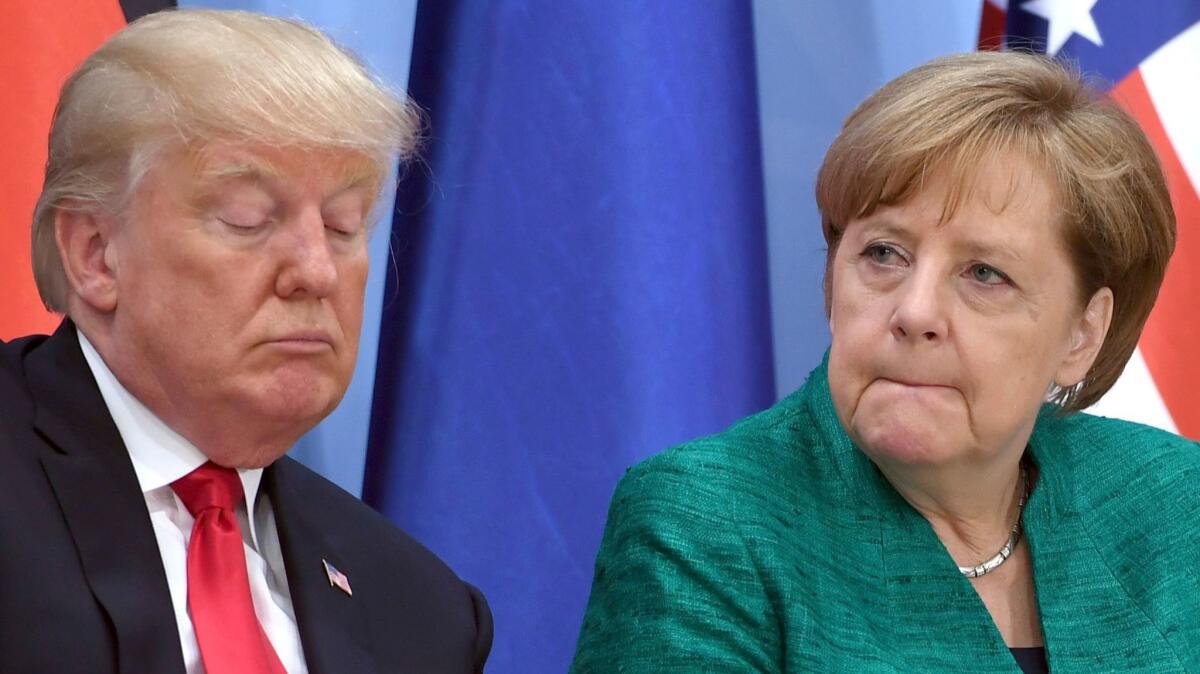Trump and Merkel’s relationship shows no thaw after G-20 summit

- Share via
Reporting from Hamburg, Germany — President Trump’s tense relationship with German Chancellor Angela Merkel hasn’t gotten any better after a two-day Group of 20 summit in Hamburg, Germany, where Trump was isolated on the other leaders’ climate resolution.
“I can’t exactly judge how things will be tomorrow or the day after,” Merkel said at a news conference after the summit finished Saturday.
Trump’s private meeting with Russian President Vladimir Putin stole the show at the G-20. But it was Merkel who was in the hot seat as she shepherded the 19 other leaders through tricky negotiations and brushed aside speculation that Trump would upend the rest of the group’s common ground on issues ranging from economic policy to development and trade.
Violent protests outside the summit increased pressure on Merkel. She is in the middle of an election campaign and despite her comfortable lead in polls, Martin Schulz, the Social Democratic candidate who is challenging her, recently amped up his criticism of her for not standing up to Trump.
Her strained relationship with Trump was on display during the summit on her home turf — her last big international meeting before the September election. She fielded journalists’ questions about her relationship with Trump and his daughter Ivanka’s participation at a G-20 event on women’s entrepreneurship — Ivanka was booed when she spoke at an event in Berlin this spring.
Merkel’s relationship with Trump buckled earlier this year when he complained about Germany’s trade surplus with the U.S. and threatened to impose tariffs on imports from the country.
Trump praised the German chancellor on Saturday, telling her, “You have been amazing, and you have done a fantastic job.” But Merkel made clear that the two leaders still don’t see eye to eye.
“I can only take things as they are,” Merkel told reporters on Saturday.
Merkel said that it was especially difficult to negotiate with Trump on trade and climate issues.
A resolution on the Group of 20’s positions published at the end of the summit singles out the Trump administration’s decision to withdraw from the 2015 Paris climate agreement, which caps emission levels. Other countries that supported the document include oil-producing countries like Saudi Arabia.
Merkel made efforts to explain after the summit that she did not broker a watered-down G-20 resolution full of concessions to Trump, even though the document mentions that his view on climate policy differs from other leaders’.
Officials working at European Union institutions pushed during document negotiations to remove a sentence referencing the United States’ plan to help other countries “use fossil fuels more cleanly and efficiently,” one EU official said on condition of anonymity.
Europeans did not want any mention of fossil fuels, and they were supported by a “critical mass of countries,” the official said on Saturday.
Government officials who did the legwork to prepare the resolution wanted to contain Trump’s views on climate change as a way to alleviate any doubt that the agreement could crash without the U.S. involved. Other leaders doubled down on their pledge to cut emissions under the Paris accord.
“Where there is no consensus, there has to be dissonance,” Merkel said, adding that she approved of the other countries’ commitment to the Paris agreement.
“The communiqué could only be agreed in the way it was agreed with the United States.”
On top of Merkel’s delicate negotiating tactics over climate policy, she said talks with Trump on trade issues were “especially hard”.
The resolution includes references to fighting trade protectionism as well as an olive branch to Trump in a line mentioning the use of “legitimate trade defense instruments” to make trade fairer.
But Trump’s relationship with European leaders is still tense.
Before meeting British Prime Minister Theresa May on the sidelines of the G-20 talks on Saturday, Trump struck a nerve.
A trade agreement between the U.S. and the U.K. will be done “very, very quickly,” Trump said, once the country finishes negotiations to leave the European Union, which are expected to end in 2019. Britain’s trade deals are a sore point for European leaders who say the U.K. cannot legally start working out new agreements until it officially leaves the 28-country bloc and stops applying its trade laws.
Those tensions will be on display again next week when Trump returns to Europe for a World War I ceremony with French President Emmanuel Macron.
Macron has criticized Trump’s withdrawal from the Paris agreement and encouraged American climate scientists to move to France.
At a news conference at the end of the G-20, Macron said, “Our world has never been so divided.”
Stupp is a special correspondent.
More to Read
Sign up for Essential California
The most important California stories and recommendations in your inbox every morning.
You may occasionally receive promotional content from the Los Angeles Times.










